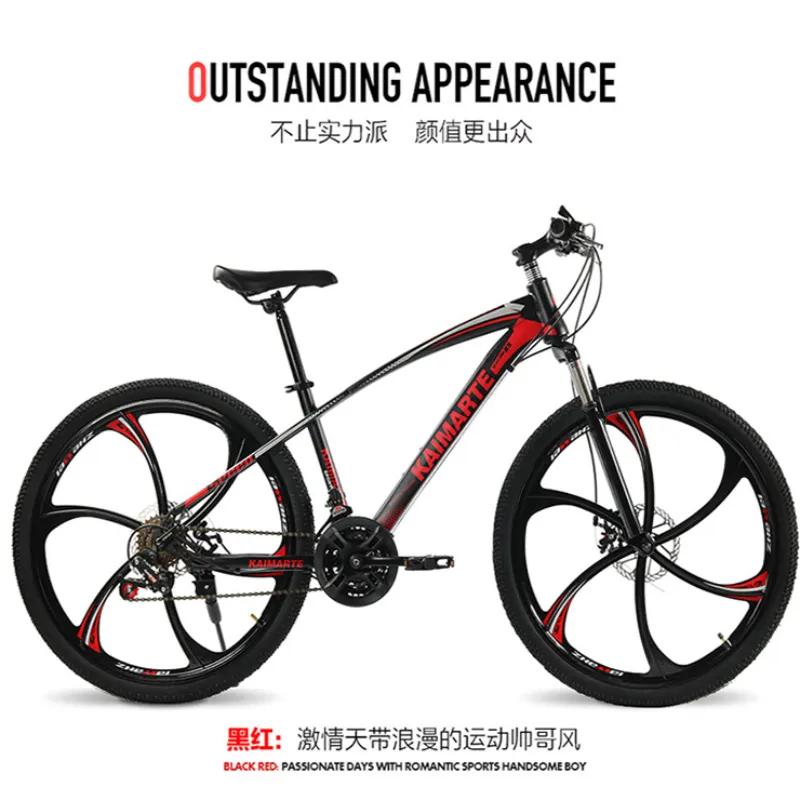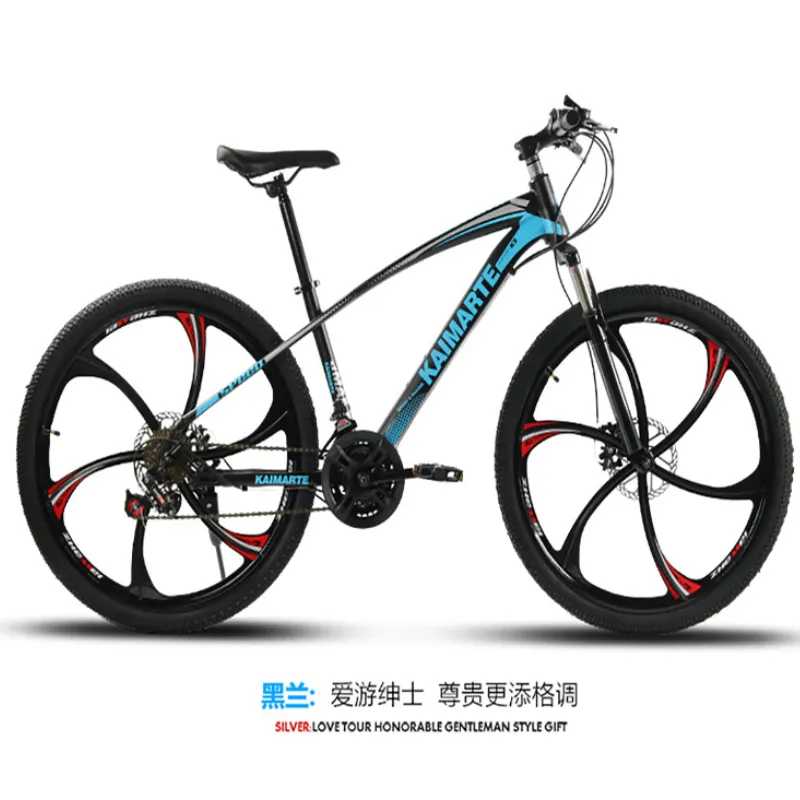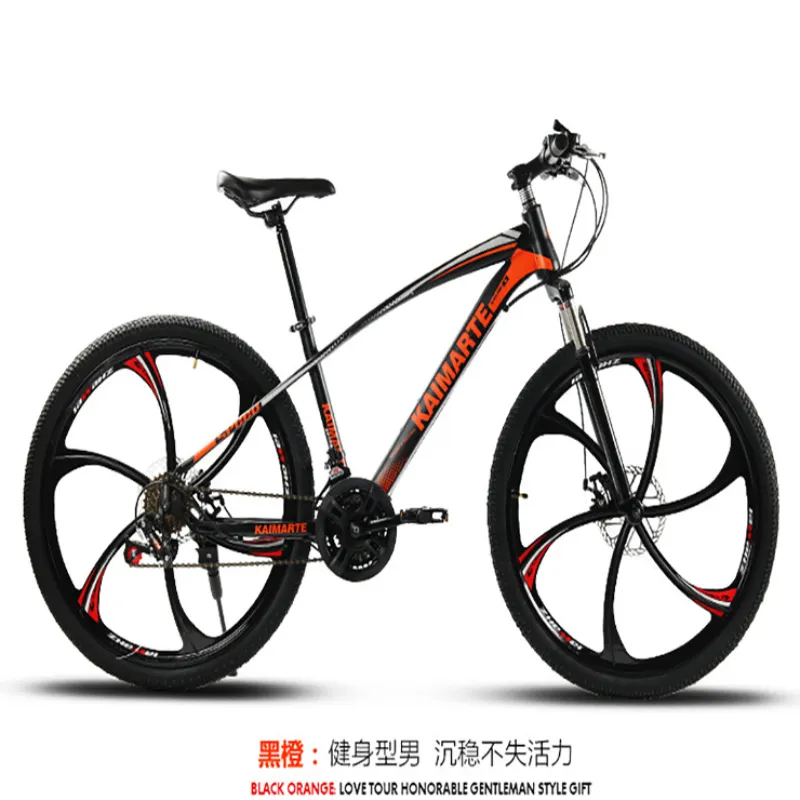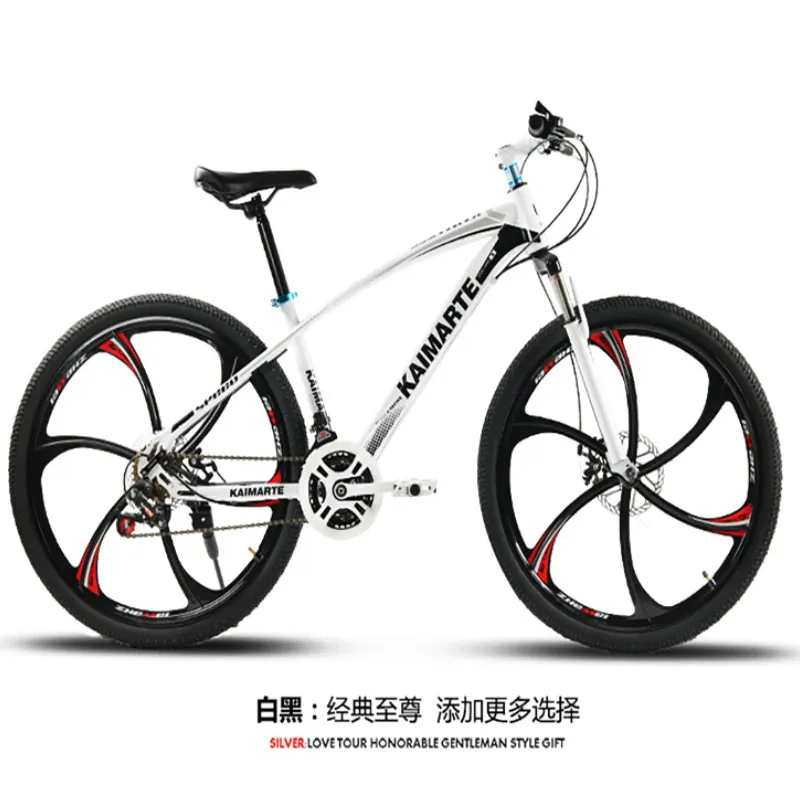Sep . 09, 2025 21:20 Back to list
26 Inch Mountain Bikes: Trail-Ready Performance & Agility
Industry Trends and Market Dynamics for the 26 Inch Mountain Bike Segment
The market for durable and versatile outdoor equipment continues to evolve, with the 26 inch mountain bike maintaining a significant presence, particularly in segments prioritizing robust construction, ease of maintenance, and cost-effectiveness. While newer wheel sizes like 27.5-inch and 29-inch have gained traction for specific performance advantages, the 26 inch mountain bike remains a preferred choice for entry-level riders, youth segments, and applications requiring extreme maneuverability or durability in demanding conditions such as urban commuting, light trail riding, and even industrial site transportation where compact size is beneficial. Its legacy in mountain biking ensures a strong aftermarket support and a vast pool of technical expertise.
Recent trends indicate a resurgence in demand for reliable, no-frills cycling solutions. The global bicycle market, valued at approximately $60 billion in 2023, is projected to grow at a CAGR of 7% over the next five years, driven by increasing environmental consciousness, health trends, and urban mobility challenges. Within this, the utility and recreational segments continue to bolster the demand for resilient bikes. Furthermore, the 26 inch mountain bike stands out for its lower barrier to entry, making it an attractive option for businesses looking to equip staff with dependable, all-terrain transport or for rental fleets in diverse environments.

Technical Specifications and Engineering Parameters
Understanding the technical specifications of a 26 mountain bike is crucial for B2B procurement, ensuring optimal performance and longevity in various operational contexts. The "Mountain Bike 26 Inch Shock-Absorbing Outdoor Riding Variable Speed Dirt Bike" from Yanlinebike.com exemplifies key engineering principles.
Core Components and Materials:
- Frame Material: High-tensile steel or aluminum alloy (e.g., 6061-T6 for weight optimization and corrosion resistance). Steel frames offer superior shock absorption and repairability, while aluminum provides a lighter chassis.
- Fork: Suspension fork (e.g., coil spring or elastomer) with 80-100mm travel, designed to absorb impacts from uneven terrain, enhancing rider comfort and control.
- Wheel Size: 26 inches, providing excellent maneuverability and strength. Rims typically constructed from double-wall aluminum for durability.
- Tires: Knobby tread patterns for multi-terrain grip, width ranging from 1.95 to 2.35 inches, optimized for traction on loose surfaces.
- Drivetrain: Variable speed systems, commonly 21-speed (3x7) or 24-speed (3x8) with Shimano or equivalent components, ensuring reliable shifting and gear ratios suitable for diverse gradients.
- Brakes: V-brakes or mechanical disc brakes. Disc brakes offer superior stopping power and consistency in wet conditions, a critical safety feature.
Product Specification Table:
Each component is rigorously selected to meet performance demands, ensuring that the 26 in mountain bike delivers a reliable and efficient riding experience, conforming to industry standards for safety and durability.
Application Scenarios and Target Industries
The versatility of the 26inch mountain bike makes it suitable for a broad spectrum of B2B applications, offering reliable transportation and operational utility across various industries.
Typical Application Scenarios:
- Industrial Facilities and Warehouses: For personnel to quickly traverse large sites, conducting inspections, delivering small parts, or responding to issues. Its compact size and maneuverability are advantageous in confined spaces.
- Petrochemical Plants: Providing efficient, emission-free transport for technicians across extensive facilities, especially where internal combustion engines are restricted due to safety protocols. The corrosion resistance of high-grade materials is paramount here.
- Metallurgy & Mining Sites: Durable construction and off-road capability make these bikes ideal for supervisors and engineers navigating rough terrain within mining operations or large metallurgical complexes.
- Water Supply & Drainage Infrastructure: For maintenance crews to access remote pump stations, pipelines, or inspection points along waterways and easements where paved roads may not exist.
- Resort & Hospitality Management: For staff to efficiently manage large resort properties, from guest services to maintenance, offering a sustainable and quiet mode of transport. Also popular for guest rental fleets.
- Logistics and Delivery Services: In urban areas, a 26 in mountain bike can serve as an agile and economical last-mile delivery solution, navigating traffic and pedestrian zones more effectively than larger vehicles.

Demonstrated Advantages in Specific Scenarios:
- Energy Saving: As a human-powered vehicle, it offers zero operational energy costs and no carbon emissions, contributing to corporate sustainability goals.
- Corrosion Resistance: For environments like petrochemical or coastal facilities, frames treated with anti-corrosion coatings or made from specific aluminum alloys significantly extend service life.
- Low Maintenance: Simpler mechanical systems compared to motorized vehicles result in reduced maintenance overhead and downtime.
- Accessibility: Can navigate terrain and pathways inaccessible to larger vehicles, enhancing operational reach.
Manufacturing Process Flow and Quality Assurance
The production of a high-quality 26 inch mountain bike involves a meticulous process flow, integrating advanced manufacturing techniques with stringent quality control to ensure product integrity and performance. Yanlinebike adheres to internationally recognized standards throughout its manufacturing pipeline.
Manufacturing Process Steps:
- Material Sourcing & Preparation: High-grade steel or aluminum tubes are sourced from certified suppliers. Materials undergo chemical composition analysis to confirm compliance with specifications (e.g., ASTM standards for alloys).
- Frame Fabrication (Casting/Forging/Hydroforming/Welding):
- Tube Cutting & Shaping: Tubes are precisely cut and formed using CNC machining or hydroforming for optimal strength-to-weight ratios and aerodynamic profiles.
- Welding: Frame components are joined using TIG (Tungsten Inert Gas) welding for aluminum or MIG (Metal Inert Gas) welding for steel, ensuring strong, clean joints. Robotic welding is often employed for consistency.
- Heat Treatment: Aluminum frames may undergo heat treatment (e.g., T6 tempering) to enhance strength and durability after welding.
- Surface Treatment & Painting: Frames are thoroughly cleaned, pre-treated (e.g., phosphating for steel, anodizing for aluminum) to enhance corrosion resistance and paint adhesion. Powder coating or liquid painting processes are applied, followed by a clear coat for protection and aesthetics.
- Component Manufacturing & Assembly:
- Wheel Building: Rims, spokes, hubs, and tires are assembled and trued (aligned) to strict tolerances.
- Fork & Drivetrain Assembly: Suspension forks are assembled and tested for damping performance. Derailleurs, shifters, cranksets, and cassettes are integrated.
- Final Assembly: All sub-assemblies (frame, wheels, drivetrain, brakes, handlebars, seat post) are brought together on an assembly line.
- Quality Control & Testing: Each 26in mountain bike undergoes rigorous testing.
- Structural Integrity: Frame fatigue testing, impact resistance testing.
- Component Functionality: Brake performance, gear shifting accuracy, wheel trueness, suspension function.
- Safety Standards: Adherence to international standards like ISO 4210 (Cycles – Safety requirements for bicycles) and potentially ANSI B175.1 (Safety Requirements for Bicycles).
- Road Simulation: Test rides or automated test benches simulate real-world conditions.
- Packaging & Shipping: Bikes are securely packed to prevent damage during transit, often partially disassembled to optimize shipping volume.
The service life of a well-maintained 26 inch mountain bike, particularly for industrial or fleet applications, can extend well beyond 5-7 years, with frame components often lasting over a decade under typical usage, thanks to robust materials and construction. Regular maintenance is key to maximizing this longevity.

Technical Advantages and Performance Metrics
The enduring popularity of the 26 inch mountain bike in B2B contexts stems from its distinct technical advantages:
- Enhanced Maneuverability: Smaller wheels provide quicker steering response and a tighter turning radius, crucial for navigating congested industrial spaces, winding trails, or urban environments with ease. This agility reduces collision risks and improves efficiency.
- Strength and Durability: With shorter spokes and a more compact wheel structure, 26-inch wheels are inherently stronger and less prone to buckling under heavy loads or impacts, making them ideal for demanding applications.
- Lower Standover Height: Often results in a lower center of gravity, offering greater stability and easier mounting/dismounting, especially beneficial for frequent stops or diverse rider heights.
- Optimal for Smaller Riders: Provides a better fit for a wider range of rider heights, expanding the user base for corporate fleets or rental services.
- Cost-Effectiveness: Generally, the manufacturing costs for 26 mountain bike components are lower, translating to more competitive pricing for bulk procurement, without compromising essential quality and features.
- Proven Technology: Decades of development and refinement mean that the technology is mature, reliable, and widely understood, simplifying maintenance and spare parts sourcing.
Key Performance Indicators (KPIs) for B2B Evaluation:
- Mean Time Between Failures (MTBF): Expected to be high due to robust construction.
- Total Cost of Ownership (TCO): Significantly lower than motorized alternatives due to minimal fuel, insurance, and complex maintenance requirements.
- Environmental Impact: Zero direct emissions, contributing positively to corporate environmental responsibility.
- Adaptability: Ability to operate effectively across diverse terrains, from paved roads to unpaved paths, without significant performance degradation.
Vendor Comparison and Competitive Analysis
Selecting the right supplier for 26 in mountain bike fleets is critical. A comparative analysis highlights key differentiators among manufacturers.
Vendor Comparison Table (Illustrative):
Yanlinebike.com positions itself strategically by offering a robust and reliable 26inch mountain bike solution that balances performance, durability, and cost-effectiveness. Our commitment to ISO-level manufacturing practices and component sourcing from reputable suppliers ensures a high-quality product without the premium price tag of specialized performance brands, making us an ideal partner for industrial and commercial fleet applications. We focus on practical features that enhance longevity and minimize maintenance, addressing the core needs of B2B clients.
Customized Solutions and OEM Capabilities
Recognizing the diverse requirements of B2B clients, Yanlinebike.com offers extensive customization options and OEM manufacturing services for the 26 inch mountain bike. Our engineering team collaborates closely with clients to tailor solutions that meet specific operational demands, brand guidelines, and regulatory standards.
Customization Areas Include:
- Frame Geometry and Material: Adjustments to frame size, specific alloy formulations for enhanced corrosion resistance, or reinforced stress points for heavy-duty usage.
- Component Upgrades: Options for hydraulic disc brakes, specialized drivetrains (e.g., internal gear hubs for low maintenance), or heavier-duty tires suitable for extreme terrains.
- Integrated Accessories: Installation of cargo racks, lighting systems (dynamo or battery-powered), robust kickstands, security locks, or GPS tracking systems.
- Branding and Aesthetics: Custom paint schemes, corporate logos, reflective decals for increased visibility, and component color coordination.
- Ergonomics: Selection of handlebars, seats, and grip types to optimize rider comfort for extended use or specific job functions.
Our OEM capabilities mean we can produce bikes under your brand name, adhering to your exact design and specification requirements. With a robust supply chain and experienced R&D department, we translate client visions into tangible, high-performance cycling solutions.
Application Case Studies and Customer Experience
Real-world implementations underscore the value and reliability of the 26inch mountain bike in demanding professional environments. Our client testimonials reflect strong positive feedback and measurable operational improvements.
Case Study 1: Large-Scale Industrial Complex
- Client: A major petrochemical refinery in the Middle East.
- Challenge: Employees needed to cover vast distances (up to 5 km per shift) quickly and safely between various processing units, often on unpaved service roads, while adhering to strict safety protocols regarding vehicle emissions.
- Solution: Procurement of 50 units of customized Yanlinebike 26 inch mountain bike with enhanced puncture-resistant tires, anti-corrosion frame treatment, and integrated high-visibility lighting.
- Results:
- Efficiency Gain: Average travel time between units reduced by 40% compared to walking.
- Cost Savings: Annual fuel and maintenance costs for internal transport vehicles reduced by an estimated 70,000 USD.
- Safety & Compliance: Zero-emission transport contributed to improved air quality on-site and full compliance with environmental regulations. Riders reported increased alertness due to physical activity.
- Customer Feedback: "The Yanlinebike 26inch mountain bike fleet has been a game-changer for our operations. They are incredibly durable, require minimal maintenance even in our harsh environment, and our staff appreciate the quick, eco-friendly way to get around." - Site Operations Manager.

Case Study 2: Urban Logistics & Delivery Fleet
- Client: A metropolitan express parcel delivery service.
- Challenge: Navigating heavy urban traffic and pedestrian zones for efficient last-mile delivery, especially for smaller packages, without incurring significant operational costs or contributing to city congestion.
- Solution: Deployment of 30 units of Yanlinebike 26 inch mountain bike, outfitted with front and rear cargo racks, integrated heavy-duty stands, and reflective corporate branding.
- Results:
- Delivery Speed: Average delivery time for packages within a 3km radius improved by 25% due to enhanced maneuverability and access.
- Operational Cost Reduction: Eliminated fuel costs and reduced parking fines, leading to a 60% reduction in per-delivery operational costs for bike-based deliveries.
- Brand Image: Enhanced corporate image as an environmentally conscious and agile delivery provider.
- Customer Feedback: "Our Yanlinebike fleet has transformed our urban delivery strategy. The bikes are reliable, easy for our riders to handle, and project a modern, eco-friendly image to our customers." - Logistics Director.
Trustworthiness, Support, and Logistics
Yanlinebike.com is committed to fostering trust through transparency, robust support, and efficient fulfillment processes for every 26 inch mountain bike order.
Frequently Asked Questions (FAQ):
- Q: What is the minimum order quantity (MOQ) for the 26 inch mountain bike?
A: Our standard MOQ is 50 units, but we can discuss specific project requirements for smaller pilot programs. - Q: Are spare parts readily available?
A: Yes, we maintain a comprehensive inventory of all standard and custom components. Clients can order spare parts directly from us or through authorized distributors. - Q: Can the bikes be delivered assembled or partially assembled?
A: We offer both options. Partially assembled (e.g., 85% assembled) for more compact shipping, or fully assembled for direct deployment, depending on client preference and logistics. - Q: What are the primary certifications for your manufacturing process?
A: Our facilities operate under ISO 9001 quality management systems, and our products adhere to ISO 4210 safety standards for bicycles.
Lead Time & Fulfillment Details:
- Standard Orders (50-200 units): Typically 30-45 calendar days from order confirmation and deposit.
- Customized/OEM Orders: Lead times range from 45-75 days, depending on the complexity of modifications and component sourcing.
- Logistics: We facilitate global shipping via sea or air freight, offering EXW, FOB, and CIF terms. Detailed tracking and freight documentation are provided.
Warranty Commitments:
Yanlinebike.com offers a robust warranty package to ensure peace of mind for our B2B partners:
- Frame: 5-year limited warranty against manufacturing defects.
- Components (Drivetrain, Brakes, Wheels): 1-year limited warranty from the date of purchase, covering defects in materials and workmanship.
- Wearable Parts (Tires, Tubes, Brake Pads): Covered for initial manufacturing defects but not normal wear and tear.
Customer Support & After-Sales Service:
Our dedicated B2B support team is available to assist with technical queries, order tracking, warranty claims, and maintenance guidance. We provide:
- Technical Documentation: Comprehensive manuals and assembly guides.
- Remote Technical Assistance: Expert advice via phone, email, or video conference.
- Spare Parts Program: Efficient ordering and delivery of replacement parts.
- Training: On-site or remote training sessions for client maintenance staff on request for large orders.
Our goal is to build long-term partnerships by ensuring every 26 in mountain bike fleet operates at peak efficiency with minimal downtime.
Authoritative References
- International Organization for Standardization (ISO). "ISO 4210: Cycles – Safety requirements for bicycles." ISO.org.
- Grand View Research. "Bicycle Market Size, Share & Trends Analysis Report By Product (Mountain, Road, Hybrid), By End-user (Men, Women, Kids), By Distribution Channel, By Region, And Segment Forecasts, 2023 - 2030." Grandviewresearch.com.
- ASTM International. "Standard Specifications for Aluminum and Aluminum-Alloy Extruded Bar, Rod, Wire, Shape, and Tube." Astm.org.
- BikeRadar. "26 vs 27.5 vs 29-inch wheels: What's best for you?" Bikeradar.com.
-
Assist Bikes – Practical Mobility Solutions for Urban and Humanitarian Use
NewsNov.19,2025
-
cs20 ebike – Durable, Efficient Electric Bike for Urban and Remote Transit
NewsNov.19,2025
-
Discover the E Chopper Bike – Stylish, Sustainable Urban Mobility
NewsNov.18,2025
-
Discover the Power and Promise of Ebike Full Systems | Sustainable Mobility Solutions
NewsNov.18,2025
-
Electric Scrambler Bike – The Stylish, Sustainable Ride for Modern Life
NewsNov.18,2025
-
Discover the Benefits and Future of Go Electric Bikes | Yanline Bike
NewsNov.17,2025
-
Discover the Benefits and Innovations of the ebike pedelec | Efficient Urban Mobility Solutions
NewsNov.15,2025




